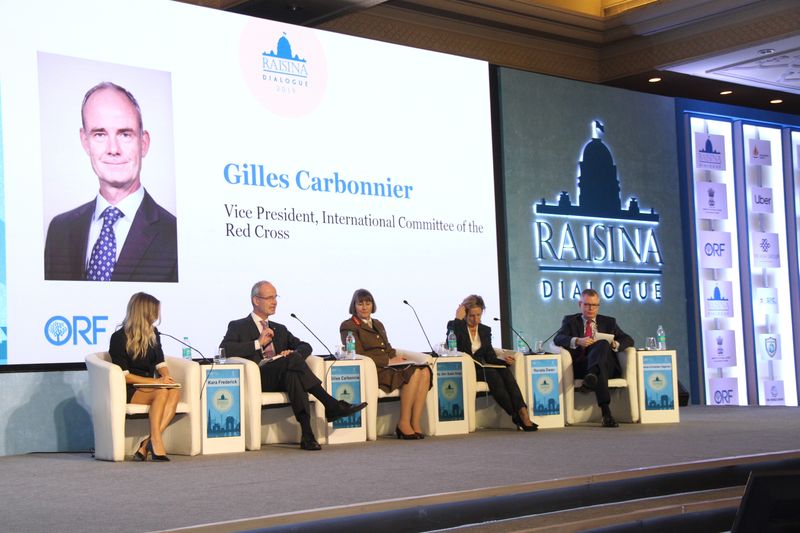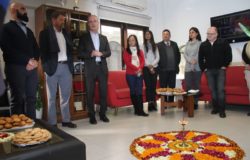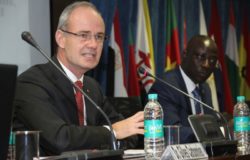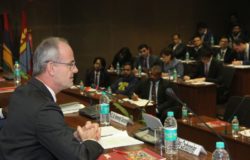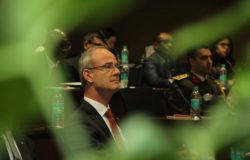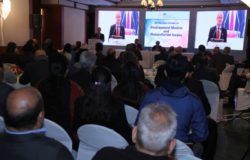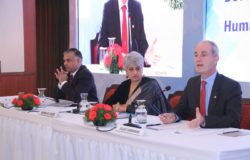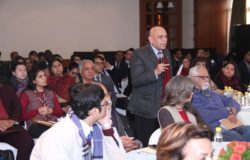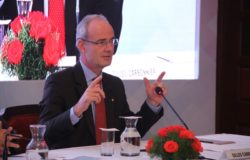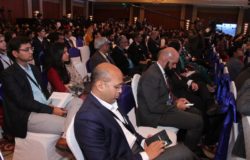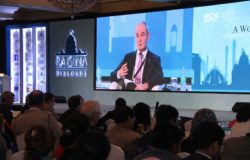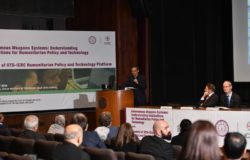Gilles Carbonnier, Vice President, International Committee of the Red Cross (ICRC), visited India 7 – 11 January 2019. His visit coincided with the 4th Raisina Dialogue, an annual track II event organised by the Observer Research Foundation (ORF) and the Ministry of External Affairs (MEA), India.
At the Raisina Dialogue, Gilles Carbonnier participated in a panel discussion on ‘Accountable Autonomy: When Machines Kill’ along with Kara Frederick from the Centre for New American Security; Renata Dwan, Director, UN Institute for Disarmament Research and Maj. Gen. Susan Ridge, Ministry of Defence, UK. The discussion was moderated by Hans-Christian Hagman, Ministry for Foreign Affairs, Sweden.
The ICRC Vice President highlighted the urgent need to adopt a human-centred approach to Lethal Autonomous Weapons Systems (LAWS) and AI-powered military applications. Batting for “meaningful human control” in weapons development, the panellists provided for an hour long encouraging dialogue on International Humanitarian Law (IHL), specifically, Article 36 of the first Additional Protocol to the Geneva Conventions, as a crowd of over a thousand people listened. Illustrating ICRC’s humanitarian concerns as a frontline organisation, Gilles asked how AI regulated weaponry would differentiate between weapon bearers and civilians in places where everyone walks around with guns, if only machines are left to take decisions at the deployment stage.
Video: Gilles Carbonnier speaks on ICRC’s global humanitarian work
While in India, the ICRC Vice President spoke at a breakfast seminar organised by the Research and Information Systems for Developing Countries (RIS) on ‘Development Models and Humanitarian Issues’. The seminar was chaired by Dr Yasmin Ali Haque, Representative, UNICEF India. Gilles explained ICRC’s views on the humanitarian-development-peace nexus and its linkages to the achievement of Sustainable Development Goals (SDGs). He said that due to the link between humanitarian action, development and peace, there is pressure on actors to carry out all three kinds of activities to show their contribution, which, in his opinion, is unnecessary. To avoid these shortcomings, he highlighted three measures: inclusion of vulnerable groups and local actors; building shock-resistant systems with innovative partnerships; and safeguarding spaces for neutral, impartial, independent, humanitarian action (NIIHA) within the nexus.
The Vice President also delivered the keynote address at the Asian-African Legal Consultative Organisation (AALCO) on ‘Humanitarianism and South-South Cooperation’. In his address, he spoke of the diversification of donors and of humanitarian response. He said that “non-traditional” donors are putting forward their vision, experiences, skills and agendas and are challenging the traditional hold of western states. Hence, the onus is now on aid providers like the ICRC and the Red Cross and Red Crescent (RCRC) Movement to prove relevance and effectiveness to the donors and communities. His address was followed by a joint AALCO-ICRC seminar on Autonomous Weapon Systems, Artificial Intelligence and Armed Conflict which saw the participation of Knut Doermann, Head of the Legal Division at the ICRC.
The Vice President’s visit ended with the launch of the IIT-ICRC ‘Humanitarian Policy and Technology Platform‘, aimed at generating and facilitating research on new technologies for humanitarian action and the compliance of new technologies of warfare with IHL.
This was the Vice President’s second visit to India, the first being in 1986, as a student. Talking about his first visit, he spoke about experiencing the energy and diversity of the country, his mesmerising visit to the Kumbh Mela and discovering Indian classical music.
Photogallery


